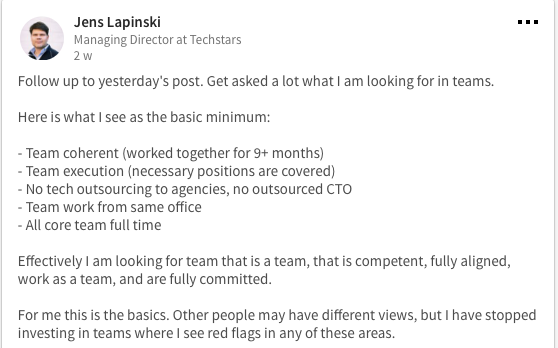How not to start a startup";
- Siddarthareddy chitiki
I’m quitting my startup journey, and it’ll make you rethink whether now is your time to start a startup.
Chutzpah is the confidence to do the impossible, daring to want what others can’t dream of, or going after “impossible goals” — Gil Kerbs
This is my fifth, and final, in a series of posts called The Chutzpah Series, in which I will share the methods and learnings of the journey of starting a startup, all with the aim to help more entrepreneurs and learn from others.
(There’s a CTA at the end, also for not-startuppers)
To give you a little background: I spent the past nine months trying to build a startup, but I was totally unprepared.
I had my Master’s Degree at a top tier business school and had experience in finance, strategy, new business development, and advising startups.
From other entrepreneurs, the piece of advice that kept recurring was:
Just do it
All entrepreneurs seemed to agree that starting a business yourself is the greatest learning experience you can get (after failing of course).
So there I was, being like, you know what, why don’t I face my insecurity and just start something? I know the odds of success are small, but yeah, let’s do it!
My past months
I cut out most activities that didn’t relate to building my startup.
The difficulty that remained: I was in a foreign country, on my own.
And so I began speaking to as many potential customers every day.
Many iterations followed. Insecurity came luring around the corner with every change I went through.
To focus even more, I stopped:
- Talking to friends who didn’t help me create value
- Opening my Facebook News Feed
- Paying attention to politics
I was basically feeling like the Stormtrooper below. I felt my idea was close, but I just couldn’t reach it.
Well here I am, nine months later, ready to tell you:
Don’t just do it!
Huh?
Let me explain
Two weeks ago, I sat down to reflect on why I was doing this. What I wanted to get out of it. What I wanted to learn. (More on this at the bottom.)
As I wrote about this and thought more and more, I realised that what I was getting out of it was nowhere close to what I could get out of it somewhere else, in an existing team.
What I want the most is to create value for others. I want to tackle complex problems in creative ways. I want to have fun and inspire others. I want to learn and grow. All of these things, I’m way more capable of doing in a team.
But why was this? Why did I just spend these months? Could I have seen this coming?
Maybe. but here’s my take on what I learned, and what I suggest every (would-be) founder to really take into account when they’re starting off.
My biggest lesson
Paul Graham, one of the most successful entrepreneurs around, claims that there are three essential things to create a good startup.
1. Good people
2. Make something customers actually want
3. Spend as little money as possible
2. Make something customers actually want
3. Spend as little money as possible
You’ve got it, Paul
That first one, good people. I thought it could come second. I would find an idea, and then find the people to help me build it. Because convincing people would be easy once you show them proof, right?
If I’d have to tell you one thing I learnt, it’s this:
Making something customers actually want will fix itself if you have good people. Spending as little money as possible will fix itself if you have good people.
Good people.
My biggest learning is this: you need good people from the start. This should be the beginning. Not the problem, not the solution, good people.
If you think you can start a startup by yourself, don’t. You might be able to, but you won’t achieve 1/10 of the results and the fun if you do it on your own.
The solution
So my advice would be this: if you’re thinking of starting a startup, find AT LEAST one good friend to join you, ideally two good friends. Make sure the combination of you covers the holy triangle of startup: hipster, hacker, hustler (aka engineer, designer, marketeer)
And then, you can move on to point two.
So don’t be like this:
But be like this:
(Funny side note, if you look for ‘entrepreneur’ on stock photo sites, you primarily find people on their own. Don’t be on your own, work with others!)
Why?
Because if you have good people from the start, making something your customers actually want becomes 100X easier. Starting a startup is a rollercoaster: turn-downs, long hours, lack of perspective. Endless iterations, nothing to fall back upon, being outside of your comfort zone.
But if you’re with good people, then you can pull each other through. The turn-downs are easier to turn around- it’s easier to get a yes if you’re not alone.
The long hours become more fun, because as the saying goes: “the more the merrier” (which is true up to a certain extent, by the way, but this is not the post for that).
The lack of perspective changes, because now you’re not working on your own, you are working with your friends. Working on something you believe in. With people you can learn a lot from. And that by itself is quite a perspective.
Oh right, who am I to say this? Well, if you don’t believe me, check out what Jens Lapinski, Managing Director of Techstars, one of the most successful accelerators worldwide, has to say about this:
A team is never one person.
What now?
So here I am, ready to go and accelerate another startup. I only decided to look for a job since two days, and there’s already been two companies who want to move interviews to the next level.
Now I don’t know exactly what my future will look like, what company I’ll be joining or the exact position I’ll be taking.
But I’m going to take up Sheryl Sandberg’s advice here:
There is no perfect fit when you’re looking for the next big thing to do. You have to take opportunities and make an opportunity fit for you, rather than the other way around. The ability to learn is the most important quality a leader can have.
CTA
First, if you’re a founder, and you’re alone, for the love of god, spend at least a good proportion of your time looking for other people to join you on your quest.
If you’re not a founder, but you find that your life is not on a successful track, and you’re not happy doing what you’re doing, ask yourself these questions:
- Where do I want to be in three years?
- What do I need to get there in 1.5 years?
- Am I in the position that brings me these things?
- If not, what alternatives exist that offer me this?
Oh, and if you know any cool startups in Holland, let me know!
Aaaaand finally, if you enjoyed the read, hit the ❤ button so others can enjoy it too.





Comments
Post a Comment